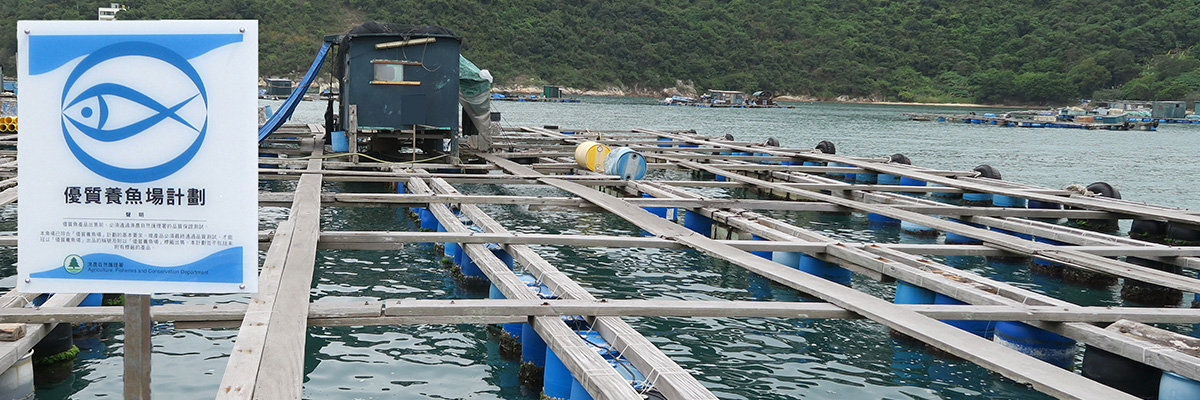

WORK OF THE FISHERIES BRANCH
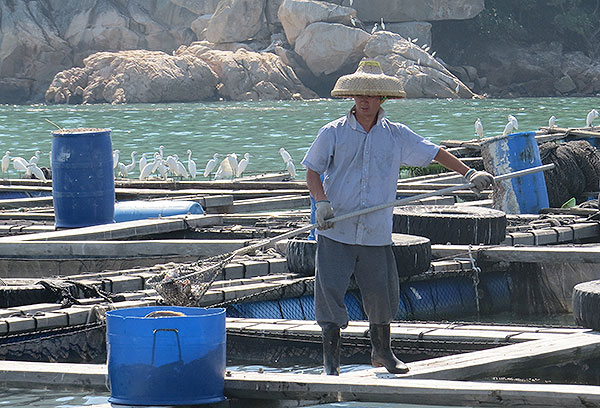
- To provide technical and financial support to fishermen and fish farmers for promoting the sustainable development of the fisheries industry;
- To enforce legislation to regulate the fisheries industry;
- To plan and implement suitable projects and measures for the conservation and management of fisheries resources; and
- To provide administrative support to the Fish Marketing Organization (FMO).
THE FISHERIES INDUSTRY
The fisheries industry, which comprises capture fisheries, mariculture and pond fish culture, provides a steady supply of fresh fish to the local market. In 2017, the production of the capture fisheries and mariculture sectors accounted for about 20% of all seafood consumed in Hong Kong, whereas pond fish farms produced about 4% of the total consumption of freshwater fish.
Capture Fisheries
In 2017, the number of fishing vessels was about 5
Mariculture
Mariculture involves rearing marine fish in cages suspended by floating rafts in sheltered coastal areas. In 2017, there were 938 licensed operators in the 26 fish culture zones designated under the Marine Fish Culture Ordinance (Cap 353), occupying a sea area of 209 hectares. Most licensed operations were small and family-based, with farm size averaging about 290 square metres. Estimated production in 2017 was 1
Pond Fish Culture
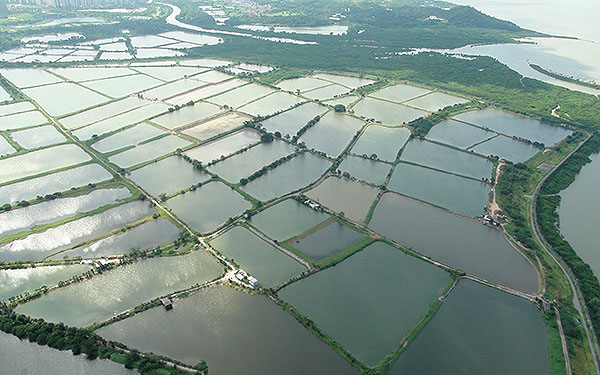
Most inland fish ponds are located in the Northwest New Territories. These ponds, covering some 1
SUSTAINABLE FISHERIES DEVELOPMENT
Ban on Trawling in Hong Kong Waters
To allow the rehabilitation of the damaged seabed and depleted marine resources, a ban on trawling has been implemented in Hong Kong waters since 31 December 2012. To complement the trawl ban and bring the fishing industry back to a sustainable path, a series of fisheries management measures has been implemented. Such measures include:
- setting up a registration system for local fishing vessels;
- limiting the entry of new fishing vessels and maintaining an appropriate level of fishing effort; and
- restricting fishing with non-fishing vessels and prohibiting fishing with non-local fishing vessels.
At the same time, the Department is preparing for the designation of fisheries protection areas to protect important nursery and spawning grounds.
Implementing the Convention on the Conservation of Antarctic Marine Living Resources in Hong Kong
To better protect the Antarctic marine living resources and contribute to the international concerted efforts in the sustainable use of marine resources, the Government proposes to introduce a control scheme for the trading of toothfish by way of a new piece of legislation for the implementation of the requirements of the Convention on the Conservation of Antarctic Marine Living Resources in Hong Kong. The Department is undertaking relevant preparatory work for the new legislation.
Combating Destructive Fishing Practices
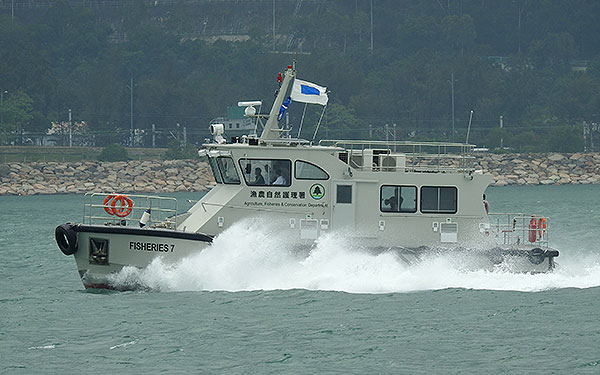
Hong Kong waters are patrolled regularly to deter destructive fishing practices prohibited under the Fisheries Protection Ordinance (Cap 171). These practices include the use of explosives, toxic substances, dredging, suction or trawling devices and apparatus that transmits electricity. Four cases of illegal fishing involving destructive fishing practices were successfully prosecuted during the year.
Artificial Reefs Deployment
Artificial reefs are effective in promoting the growth and development of various marine organisms which in turn provide food, protection and shelter for fish. Since 1996, the Department has been implementing an artificial reefs project and some 179
Support Services
The Department provides technical support, training and liaison services, and credit facilities to fishermen. During the year, the Department continued to liaise with both Mainland and foreign fisheries authorities and agencies to obtain information on recreational fishing, aquaculture, fish processing and other sustainable fisheries operations, and disseminate it to fishermen. Technical advice was also given to fishermen to help formulate their development proposals.
The Fisheries Development Loan Fund (FDLF) provides credit facilities for the industry. Fishermen may make use of the FDLF to switch to more sustainable fisheries operations and other fisheries-related operations, or for carrying out projects that will reduce fuel consumption or carbon footprint of their operations. Fish farmers may also borrow loan to develop aquaculture or improve their aquaculture businesses. The capital of the fund is $1.1 billion.
The duration of the annual fishing moratorium in South China Sea implemented by the Mainland authorities was extended to three and a half months from May to mid-August in 2017. To help the 1
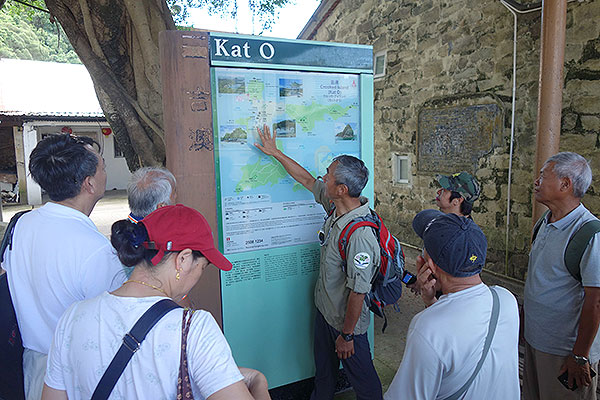
The Department continued to provide free training courses and seminars to fishermen during the Lunar New Year and the fishing moratorium in 2017 with a view to promoting sustainable fisheries development and assisting fishermen switching to other sustainable fisheries operations.
The Sustainable Fisheries Development Fund with the objective of funding projects that would help the local fishing community move towards sustainable or high value-added operations has so far approved eight applications (six on aquaculture and two fisheries-related eco-tour projects), involving a total commitment of about $41.2 million.
Fisheries Impact Assessment
To protect fisheries resources and habitats, the Department vets and provides professional advice on development proposals, relevant environmental impact assessment studies as well as monitoring and audit programmes to ensure that the potential impacts of development projects on fisheries have been adequately addressed and evaluated, and that such impacts would be avoided or minimised through effective mitigation. The Department also assists in conducting investigations in fish kills or water quality deterioration incidents allegedly caused by development projects with a view to providing prompt advice on remedial actions and minimising fish loss.
AQUACULTURE
Proper Management of Marine Fish Culture Activities
Under the Marine Fish Culture Ordinance (Cap 353), all marine fish culture activities in Hong Kong are required to be operated under licence in designated fish culture zones. The Department conducts regular patrols in these fish culture zones to ensure that fish culture activities comply with the Ordinance and the licence conditions.
To meet the public demand for recreational fishing facilities and to help mariculturists diversify their business, the Department has implemented a scheme allowing mariculturists to operate recreational fishing business on licensed fish culture rafts. As at March 2018, 50 licensees in ten fish culture zones have been given the permission to conduct such business.
Safeguarding Aquaculture Environment
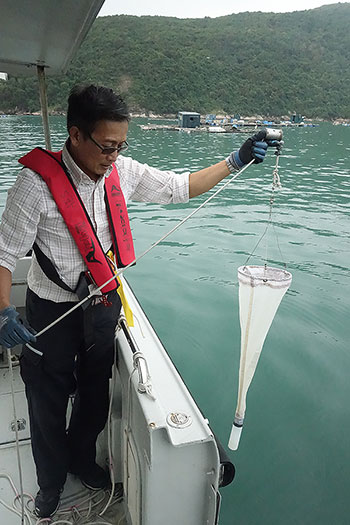
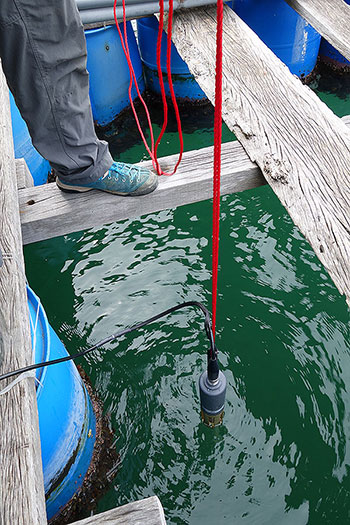
To minimise the impact of red tides and water quality deterioration on mariculture, the Department installs real-time water quality monitoring systems in fish culture zones, regularly takes samples from fish culture zones to monitor water quality and implements a red tide monitoring and management programme. The latter includes proactive phytoplankton monitoring before the formation of red tide and rapid risk assessment of reported red tide incidents. Prompt red tide warnings and technical advice are disseminated to mariculturists and the public through instant text messages, the red tide support groups set up in various fish culture zones, press releases and the Red Tide website.
Fifteen red tide incidents were recorded in Hong Kong waters in 2017 and no associated fish kills were reported.
Promoting Good Aquaculture Practices
To help fish farmers minimise losses due to fish diseases, the Department has put in place a fish health inspection programme. During the year, regular farm visits were conducted to facilitate early detection of disease outbreaks, training was provided to fish farmers on disease prevention measures, and fish disease diagnosis and treatment services were given in case of an outbreak. Under the "Good Aquaculture Practices Programme", the Department visits fish farms regularly to collect water and fish samples for analysis to monitor conditions of the farms. Seminars, on-farm demonstrations and advisory booklets are given to farmers on new techniques and good management practices.
Accredited Fish Farm Scheme
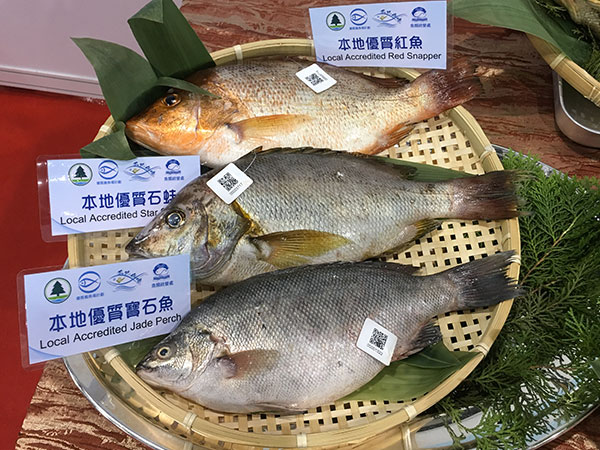
A voluntary Accredited Fish Farm Scheme (AFFS) has been implemented since 2005 to enhance the competitiveness of the local aquaculture industry. Participating fish farms are required to adopt a set of good aquaculture practices with a view to raising the environmental hygiene standards of the fish farms and the quality of cultured fish. Quality assurance tests, including analyses of drug residues and heavy metals in fish, are conducted to ensure that all cultured fish meet food safety standards before they are sold in the market. The scheme has been very well received by local mariculturists and pond fish farmers. As at March 2018, 120 fish farms (47 freshwater farms and 73 mariculture farms), representing 22% of the total area of local fish farms, have registered under the scheme.
Accredited fish products are sold bearing an AFFS fish tag. To highlight the brand and ensure citizens can purchase safe and high-quality fishery products, the Department introduced the all-new AFFS traceable quick response (QR) code fish tag in September 2016. The tag bears the AFFS logo and a traceable QR code. By scanning the QR code with a mobile device, consumers can easily obtain information of the fishery product such as food safety test results, fish farm information and its contact. In collaboration with the FMO, the Department continued to publicise and promote the marketing of fish products accredited under the scheme.
Voluntary Registration of Local Aquaculture Farms
To monitor and promote the quality of local aquaculture farms, the Department implements a voluntary registration scheme for local pond fish farms. As at March 2018, 326 pond fish farmers have registered under the scheme.
Promoting Development of Local Fish Hatchery
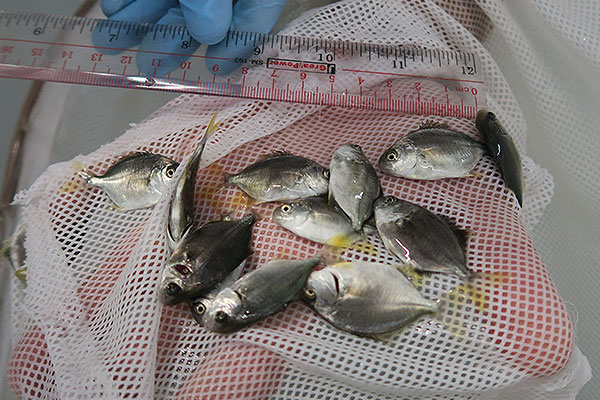
The Department has been conducting fish hatchery trials in Ta Kwu Ling since 2008 and assisting local fish farmers in setting up local hatcheries and nurseries. The hatchery has successfully produced black seabream and pompano fish fry in 2016/17, and organised workshops to transfer the hatchery technology to interested fish farmers.
The Department proactively recommends culture species with good market potential to fish farmers including Siganus guttatus and Whiteleg shrimp. In addition, the Department will continue to collaborate with the industry for technology transfer and assist to develop efficient culture techniques of these species.
Organic Aquaculture
The Department has been supporting local fish farmers to further improve their competitiveness in the market by helping them to acquire the knowledge of organic aquaculture and assisting them to obtain relevant accreditation for their farms since 2010. Their organic aquaculture products were well received by local consumers.
Surveillance of Antimicrobial Use and Antimicrobial Resistance
With the implementation of "Hong Kong Strategy and Action Plan on Antimicrobial Resistance (2017-2022)", the Department conducts surveillance of antimicrobial use and antimicrobial resistance situation in local fish farms since May 2017 with a view to promoting prudent and responsible use of medications, and enhancing biosecurity in aquaculture. As at March 2018, the Department has visited and briefed 126 fish farms about the action plan.
MARKETING
Ensuring Orderly Wholesale Marketing
The Department provides technical and administrative support to the FMO, a statutory organisation established under the Marine Fish (Marketing) Ordinance (Cap 291) to ensure that orderly fish marketing services are provided to fishermen and fish traders through the wholesale fish markets operated by the FMO. The Department also undertakes enforcement actions against illegal wholesale marketing of marine fish.
Promotion of Local Fisheries Products
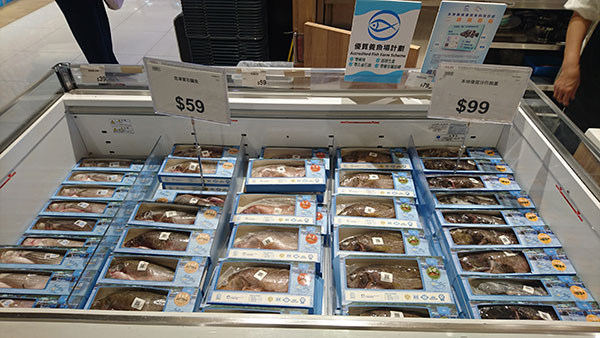
The Department works closely with the FMO to promote local fisheries products. During the year, the FMO continued to develop quality fisheries products at its processing centre and to bring local fisheries products, including organic fish and other fish accredited under the AFFS, to the public through its marketing network. The "Local Fresh" mobile application of the FMO launched in 2016 offers a convenient platform for ordering local premium fish and provides information on local premium fisheries products. In 2017, the FMO promoted the sale of high-quality fisheries products in quick-frozen form, facilitating the purchase of the products by customers at convenient chain stores. The sales response is good, and the FMO will continue to develop sales channels for the local fisheries products.
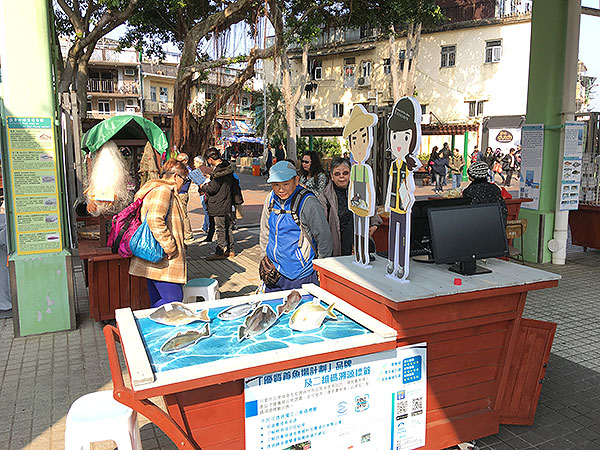
In cooperation with local fisheries associations, the FMO has been organising a fishermen weekend bazaar at Sai Kung Wholesale Fish Market to promote sale of local fisheries products since June 2015. A local fisheries association, a non-profit making social organisation and the FMO have stalls set up in the bazaar, selling local fisheries products and souvenirs and promoting the local fisheries and fishermen culture.
Since 2007, the department has in conjunction with the FMO and the VMO organised the annual FARMFEST to showcase the local premium agricultural and fisheries products. FARMFEST 2018 which was held from 12 to 14 January 2018 had an admission record of over 207